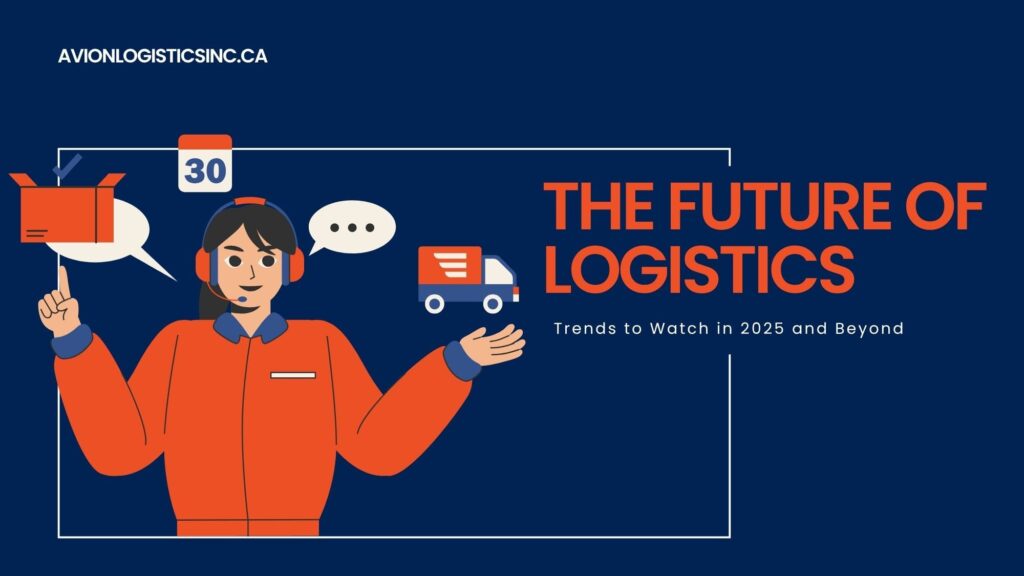
The logistics industry stands at the edge of a digital and operational revolution. With technological breakthroughs, evolving consumer expectations, global economic shifts, and environmental pressures, logistics companies in 2025 face a world of both disruption and opportunity.
From autonomous trucks to carbon-neutral supply chains, the future of logistics will look significantly different than it does today. In this article, we explore the top logistics trends in 2025 and beyond, helping forward-thinking companies like Avion Logistics adapt, thrive, and lead the way in the evolving landscape.
1. Artificial Intelligence (AI) and Machine Learning Are Reshaping Logistics
AI and machine learning are no longer buzzwords—they’re central to the future of logistics. In 2025, logistics companies are using AI for:
1. Demand forecasting: Predicting order volumes using historical data and market trends.
2. Route optimization: AI can calculate the fastest, most fuel-efficient routes in real time.
3. Warehouse automation: Machine learning helps optimize inventory levels and streamline picking, packing, and restocking.
4. Customer service: AI-powered chatbots are handling common inquiries instantly, improving response times and satisfaction.
As AI becomes more affordable and accessible, even mid-sized logistics firms like Avion Logistics can harness its power to gain a competitive edge.
2. Automation and Robotics Are Becoming the Norm
The rise of warehouse and delivery automation is accelerating. In 2025, companies are deploying:
1. Automated Guided Vehicles (AGVs) for material movement inside warehouses
2. Robotic arms for high-speed sorting and packing
3. Autonomous delivery robots and drones for last-mile delivery in urban centers
Automation not only improves efficiency but also mitigates labor shortages—one of the biggest challenges in the logistics industry today.
Example: Amazon’s warehouses already use over 750,000 robots. Mid-sized logistics providers can adopt scalable versions of these systems to stay competitive.
3. Real-Time Visibility Is a Customer Expectation
Gone are the days when tracking numbers offered vague delivery windows. In 2025, real-time shipment visibility is not just a nice-to-have—it’s expected.
Using advanced IoT (Internet of Things) devices, logistics providers can offer:
1. Live location tracking
2. Temperature and humidity monitoring for perishables
3. Predictive delivery time updates
This level of transparency builds customer trust and allows companies to proactively handle issues such as delays, reroutes, or weather disruptions.
Avion Logistics can stay ahead by integrating real-time visibility tools into its tracking systems, offering clients full transparency and control over their shipments.
4. Green Logistics and Sustainability Are Industry Imperatives
Sustainability is no longer optional—it’s now a core strategic focus. Customers, investors, and regulators increasingly demand environmentally responsible logistics.
Key green trends shaping 2025 and beyond:
1. Carbon-neutral transportation through electric trucks and alternative fuels (e.g., biodiesel, hydrogen)
2. Eco-friendly packaging to reduce plastic waste
3. Green warehousing with energy-efficient lighting and HVAC systems
4. Route optimization to lower fuel usage and emissions
Many logistics companies are committing to net-zero emissions by 2030 or 2040. Avion Logistics can stay ahead by investing early in sustainable practices and promoting them as a unique selling point.
5. Blockchain Technology Enhances Trust and Transparency
Blockchain in logistics enhances security, traceability, and trust across the supply chain. By 2025, we’re seeing increased adoption of blockchain for:
1. Smart contracts that automate and enforce shipping agreements
2. Tamper-proof audit trails for high-value or sensitive goods
3. Faster and more secure customs clearance
For example, Maersk and IBM’s TradeLens platform uses blockchain to digitize shipping documents and reduce fraud.
Companies like Avion Logistics can explore blockchain partnerships or solutions to improve cross-border shipping and supply chain visibility.
6. E-commerce and Last-Mile Delivery Are Driving Innovation
The e-commerce boom continues, and with it, the demand for faster, cheaper, and more reliable last-mile delivery.
Current trends in last-mile logistics:
1. Micro-fulfillment centers in urban areas for same-day delivery
2. Crowdsourced delivery networks (think Uber-style delivery drivers)
3. Parcel lockers and smart drop-off points
Last-mile delivery now makes up over 50% of total shipping costs, which is why logistics companies are investing in smarter routing, mobile apps, and automation.
Avion Logistics can benefit from forming strategic alliances with e-commerce platforms and optimizing last-mile delivery models to improve profitability and service quality.
7. Data-Driven Decision Making with Advanced Analytics
In 2025 and beyond, logistics companies are leveraging big data and predictive analytics to:
1. Monitor performance KPIs in real time
2. Predict maintenance needs for fleet vehicles
3. Improve warehouse layout efficiency
4. Anticipate seasonal demand surges
Instead of reacting to issues, companies can now predict and prevent them, thanks to real-time data integration across platforms.
For Avion Logistics, implementing data analytics dashboards and investing in a centralized transportation management system (TMS) will provide actionable insights across the entire supply chain.
8. Supply Chain Resilience Is a Top Priority
The COVID-19 pandemic and global geopolitical tensions exposed the fragility of global supply chains. In 2025, resilience is prioritized through:
1. Diversified sourcing strategies
2. Nearshoring and reshoring to reduce dependency on overseas suppliers
3. Multi-modal logistics strategies to avoid overreliance on any one mode of transport
4. Scenario planning and risk modeling
Logistics providers that can help clients build redundancy and flexibility into their supply chains will be in high demand.
Avion Logistics can position itself as a reliable, resilient partner by offering adaptable transportation routes, contingency planning, and supplier diversification.
9. Workforce Transformation in Logistics
While automation is rising, human workers remain essential. In 2025, the logistics workforce is transforming in several ways:
1. Upskilling and retraining in digital tools and systems
2. Remote fleet monitoring via cloud-based software
3. More focus on safety, ergonomics, and well-being
Additionally, companies are embracing diversity, equity, and inclusion (DEI) in hiring and leadership roles.
Logistics firms like Avion Logistics should invest in employee training, digital literacy, and strong workplace cultures to retain top talent in a competitive labor market.
10. Autonomous Vehicles and Drones Are Approaching Maturity
By 2025, autonomous trucks and delivery drones are transitioning from pilot projects to real-world deployment in select regions.
Key developments:
1. Self-driving freight trucks are handling long-haul routes in controlled environments
2. Drones are used for urgent medical or rural deliveries
3. Autonomous forklifts and warehouse robots are replacing manual labor in predictable workflows
Though widespread adoption may take longer, logistics firms that prepare now will be first in line to benefit from these technologies.
Avion Logistics could explore autonomous vehicle partnerships or test drone-based delivery for specific use cases like remote-area shipments.
How Avion Logistics Can Stay Ahead
As a forward-thinking logistics company, Avion Logistics can stay ahead of 2025 trends by:
✅ Investing in AI-powered fleet and route optimization tools
✅ Upgrading to telematics and real-time shipment tracking systems
✅ Exploring automation in warehousing and order fulfillment
✅ Committing to sustainability goals with green fleet and packaging solutions
✅ Building a culture of innovation and continuous learning
By strategically embracing these trends, Avion Logistics can solidify its position as a leader in Canadian and cross-border logistics.
Conclusion
The logistics industry is undergoing a dramatic transformation. From AI and robotics to green logistics and blockchain, the trends shaping 2025 will redefine how goods are moved, stored, and delivered across the globe.
Companies that embrace innovation and adapt early—like Avion Logistics—will not only remain competitive but also lead the future of freight.
The question isn’t whether these changes will happen. It’s how fast you’re ready to act.


